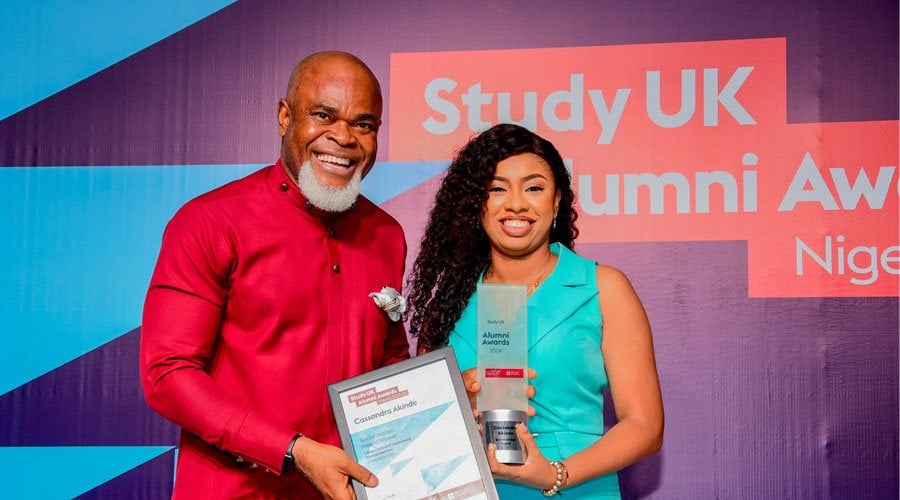Cassandra Akinde - StudyUK Nigeria Alumni Award winner 2024
6 March 2024 London School of Hygiene & Tropical Medicine London School of Hygiene & Tropical Medicine https://lshtm.ac.uk/themes/custom/lshtm/images/lshtm-logo-black.png
Cassandra Akinde (MSc Tropical Medicine & International Health, 2021) has been selected as the winner of the StudyUK Award in the Social Action category in Nigeria. As the Executive Director of The Neo Child Initiative for Africa, she is dedicated to improving access to healthcare for children in low resource settings. We spoke to her about her inspiring work and how it feels to be recognised with this award.
Please could you briefly describe the purpose of your research/current work?
I am a global health practitioner and a researcher with 8 years’ experience in designing disease control programs and policy-oriented solutions to improve health outcomes of women and children living in under-served communities in Sub Saharan Africa. I am the Executive Director of The Neo Child Initiative for Africa (TNCI), an NGO that seeks to improve access to essential healthcare services and sustainable education among children in low resource settings in Nigeria. Through this initiative, my team and I have conducted over 15 community health programs focused on WASH, Nutrition, Deworming, Malaria, and vaccine-preventable diseases like Pneumonia, Tetanus and Hepatitis. I am presently the lead principal investigator on a Royal Society of Tropical Medicine, and Hygiene (RSTMH) and National Institute for Health and Care Research (NIHR) funded research project assessing the impact and effectiveness of teacher led WASH intervention on handwashing practices and prevention of diarrhoea, undernutrition, and pneumonia among school children in primary schools in Lagos, Nigeria. The purpose of this research is to provide valuable evidence regarding School WASH programming that could contribute to changing policy, update the WASH curriculum in schools and evidenced based information in building a road map to reduce disease burden associated with the prevalent unhealthy sanitation and hygiene practices of children in Nigeria and enhance individual health and community resilience.
How did your experience at LSHTM help to shape your future career path?
Studying at LSHTM has always been my dream. I chose this school because it offered me the unique opportunity to be formally trained on epidemiology by world-renowned experts and gain superior foundational skills in quantitative/qualitative research, data analysis and designing public health interventions in low- and middle-income countries. My LSHTM degree not only prepared me for a move from clinical medicine to infectious disease epidemiology but also deepened my interest in global health and research in infectious and tropical diseases. The diversity of staff, students and global health lecturers provided a true international experience. It opened me to global public health volunteering experiences with Save The Children UK, Royal Society of Tropical Medicine, and Hygiene and Polygeia that I would not have had otherwise. Moreover, LSHTM served as an excellent platform for upskilling my research skills through volunteering with the LSHTM Vaccine Centre, where I was able to apply my grassroot experiences of child health programming and translating it into evidence-based policy discussions with other researchers in high-, middle- and low-income countries.
How has being mentored by other alumni helped you in your professional life?
Being mentored by LSHTM Alumni has led me to build an extensive network of global health experts both locally and across the world with whom I could share ideas, be recommended for a professional opportunity and work on collaborative research projects. I particularly benefited from being mentored on the art of writing the grant proposals which have helped me win multiple grants worth of $30,000. I also recently collaborated on a systematic review of Dengue diagnostic test accuracy with my former classmates and professors and its abstract was presented at the just concluded Royal Society of Tropical Medicine and Hygiene Annual Conference 2023 in London. I am currently being supervised on a research project by a fellow LSHTM Alumna Dr Adepeju Adeniran who is also the Country Chair for Women in Global Health Nigeria and my mentor.
If you have mentored any students/alumni, how has that experience benefited you as well?
As an Alumni Ambassador and Chevening Scholarship Alumna, I have been actively involved in mentoring prospective applicants and sharing various application tips with them through webinars, workshops and seminars. I constantly inspire medical students and early career public health professionals to pursue a career in public health and volunteer in the development sector to build capacity. Upon my return to Nigeria, I joined my country's alumni community and was elected to serve as an executive member of LSHTM Alumni steering committee. With these positions, I have facilitated 10 workshops on how to write winning personal statements, choose a public health program and research proposals for both master’s and PhD students. This has helped me to garner more self-confidence and boost my interpersonal communication and public speaking skills.
How did you feel when you heard you were a finalist for this award?
I was thrilled to hear I became a finalist for Study UK Alumni Awards 2024 as just a couple of years ago I was just a guest celebrating winners and finalists from Nigeria and around the world. I was particularly excited to be recognized for my humanitarian work with The Neo Child Initiative for Africa and even win in the Social Action Category. It was really humbling!
Can you tell us a bit about why you think it is important to stay connected with LSHTM?
It’s good to keep connected with LSHTM to keep updated on the global news and innovative research by regularly attending the global health lectures either virtually or in person and participate in discussion forums organized by LSHTM for its Alumni. It is also lovely to engage with LSHTM and explore views from world-leading experts on the latest research in global health.
